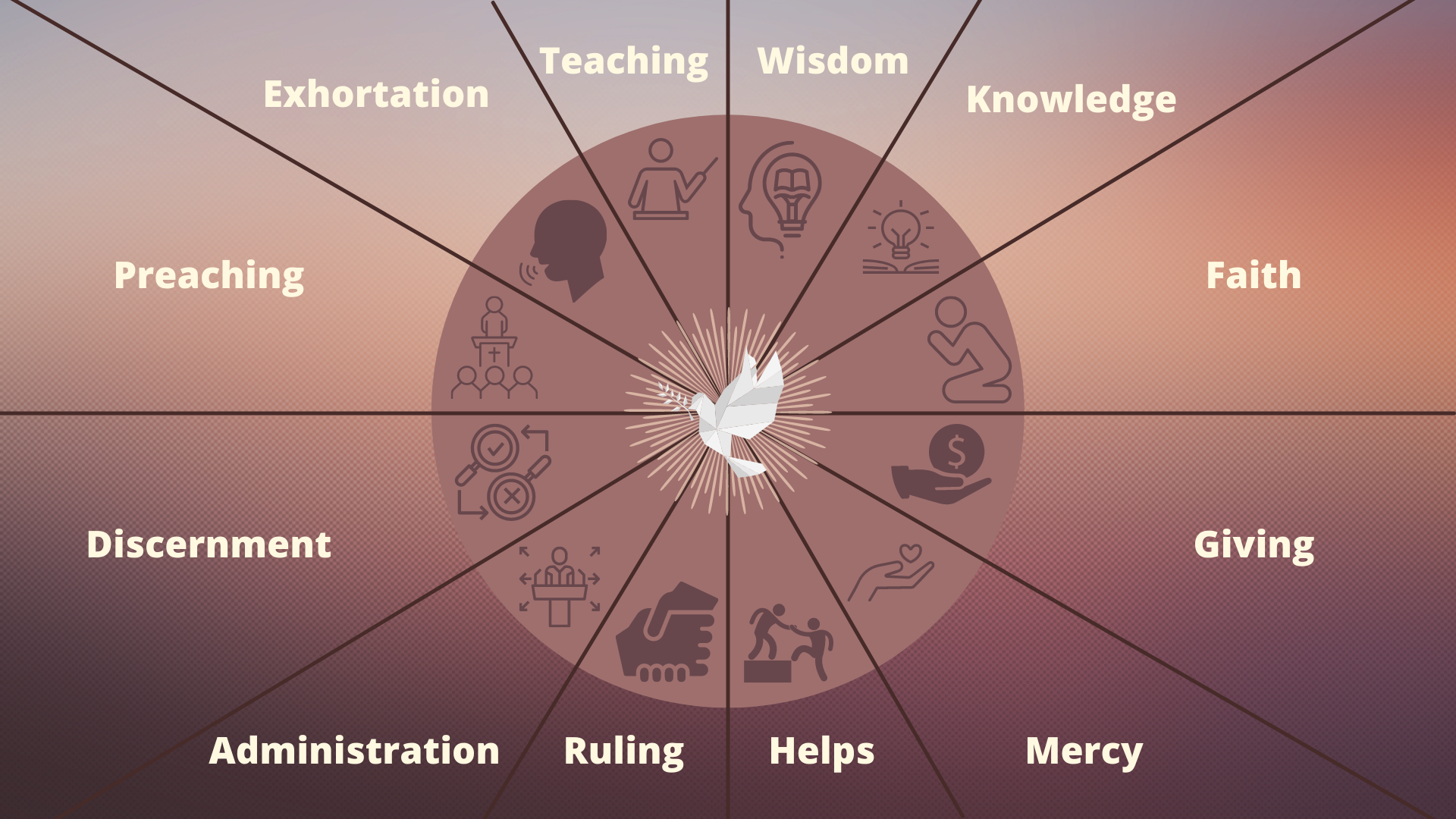1. I speak up for Christian principles even when what I say is not popular.
2. I enjoy encouraging and giving counsel to those who are discouraged.
3. I have an ability to study a passage of Scripture thoroughly and effectively share its truth with others.
4. I often have insights that offer practical solutions to difficult problems.
5. I enjoy studying difficult questions about God’s Word and tend to find answers more easily and more quickly than others.
6. I am confident of achieving great things for the glory of God.
7. I enjoy giving money to those in serious financial need.
8. I enjoy comforting people in hospitals, prisons, or nursing homes.
9. I enjoy working behind the scenes without public recognition.
10. I can be counted on to step forward and assume leadership in a group where none exists.
11. I have the ability to organize ideas, people, and projects to reach a specific goal.
12. People often say I have good spiritual judgment.
13. I feel a need to speak God’s messages from the Bible to help people know what God expects of them.
14. After I talk one-on-one with people, they often are spurred to take positive action.
15. When a question arises from a difficult Bible passage, I am motivated to research the answer.
16. When they don’t know what to do, people often ask my advice.
17. I enjoy gathering information from multiple sources to find answers or information.
18. I often step out and start successful projects other people won’t attempt.
19. I joyfully give money to the church well above my tithe.
20. I feel compassion for hurting and lonely people and like to spend time with them to encourage.
21. I would like to assist my pastor and other church leaders so they will have more time to accomplish their essential ministries.
22. I don’t mind asking others to accomplish an important ministry for the church.
23. I am organized, set goals, and make plans to reach those goals.
24. I am a good judge of character and can identify spiritual falsehood.
25. It is easy for me to apply biblical principles to present-day situations.
26. I feel a need to challenge others to better themselves in their spiritual growth without condemning them.
27. Others listen to and appreciate my teaching of Scripture.
28. The Lord enables me to make appropriate application of biblical truth to practical situations.
29. I can independently recognize difficult biblical truths and principles.
30. I trust God’s faithfulness even when everything looks bad.
31. I am open to lowering my standard of living in order to be able to give more to the church or to others in need.
32. I want to do whatever I can for needy people, even if it means giving up something.
33. I enjoy relieving others of routine tasks so they can get special projects done.
34. I can guide and manage a group of people toward achieving a specific goal.
35. I am comfortable delegating significant responsibilities to other people.
36. I am able to distinguish between right and wrong in complex spiritual matters that aren’t clear to others.
37. I can organize and present biblical truth clearly in a way others understand.
38. People will tell me things they don’t tell others because they find it easy to talk to me.
39. My thinking is organized and my approach systematic when presenting Bible lessons to a group.
40. I am able to interpret and apply Scripture with keen insight.
41. I stick with a study I’ve started in order to develop a more complete understanding.
42. I often exercise my faith through prayer, and witness the Lord’s answers.
43. When I give money to someone, I often give anonymously and don’t expect anything in return.
44. When I hear of unemployed people who can’t pay their bills, I do what I can to help.
45. I enjoy helping others get their work done.
46. People often respect my opinion and follow my direction.
47. I can discipline myself under pressure to accomplish goals.
48. People come to me for help in distinguishing between spiritual truth and error.
49. I find the fundamental truths of Scripture to be worth repeating over and over.
50. I will stay with people and encourage them to finish a task once they have started it.
51. I can explain the teaching of the Bible clearly and concisely.
52. It is easy for me to put ideas into words, to analyze situations, and explain them well.
53. I have understood problems in the church and have seen answers when others didn’t.
54. I am willing to take on difficult assignments and meet obstacles head on.
55. I want to share my financial resources to help others in worthy endeavors.
56. I willingly lay aside my own desires in order to help others.
57. I often rearrange my schedule so I can help others.
58. I enjoy inspiring others and leading them for the sake of Christ’s work.
59. I can see the “big picture” of a project and can coordinate others who only see smaller parts.
60. When evaluating a situation, I am able to pinpoint sources of difficulty.
61. I challenge people to set high standards of biblical conduct in their daily lives.
62. I have deep concern for the spiritual welfare of Christians in crisis.
63. I have shared biblical truth with others in a way that they have found meaningful and helpful.
64. When discussing a problem, I can clarify the issue and what is needed to resolve it.
65. I study the Bible systematically, trying to see how one part relates to another.
66. I confidently expect God to respond to situations committed to Him in prayer.
67. Sharing financial resources for Christian ministry is one of the greatest joys of my Christian walk.
68. People tend to call on me when help is needed for someone in distress.
69. I share my material possessions with others when they are in need.
70. People seem to look to me for leadership when I am in a group.
71. I enjoy working out the necessary details to organize people and resources for a more effective ministry.
72. I seem to know when a situation is not right.
73. I long to proclaim the truth of God’s Word with authority and conviction.
74. I enjoy encouraging others by sharing God’s promises from Scripture.
75. I enjoy communicating biblical truth to others and seeing growth in their Christian faith.
76. I apply spiritual truth effectively in my own life.
77. I study matters thoroughly, so as to locate information others might overlook.
78. I’ve had great dreams and aspirations turn into reality despite the unlikeliness of accomplishing them.
79. When I give sacrificially, I am confident that the Lord will provide for my needs.
80. Preparing meals or helping those less fortunate gives me satisfaction and pleasure.
81. I enjoy short-term tasks rather than long-term projects.
82. I will take full responsibility to get things done and remain optimistic in spite of difficulties.
83. When faced with a difficult situation, I can get to the heart of the problem and take steps to resolve it.
84. When counseling, I can correctly identify a problem.



